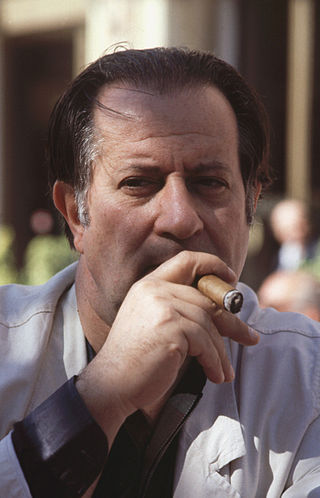Top Qs
Timeline
Chat
Perspective
Tinto Brass
Italian film director From Wikipedia, the free encyclopedia
Remove ads
Giovanni "Tinto" Brass (born 26 March 1933) is an Italian film director and screenwriter. In the 1960s and 1970s, he directed many critically acclaimed avant-garde films of various genres. Today, he is mainly known for his later work in the erotic genre, with films such as Caligula, Così fan tutte (released under the English title All Ladies Do It), Paprika, Monella (Frivolous Lola) and Trasgredire.
Remove ads
Career
Summarize
Perspective
Avant-garde cinema
In the 1960s and 1970s, Brass was considered a promising experimental and avant-garde director, and his debut film Who Works Is Lost got very favorable reviews after screening at Venice Film Festival 1963.[1] In 1964, he was commissioned by Umberto Eco to create two short films experimenting with visual language for the 13th Triennale di Milano – Tempo Libero and Tempo Lavorativo.[2] Throughout the 1960s and early 1970s, Brass directed films in many genres, including western (Yankee) and crime (Col cuore in gola), all using a very experimental editing- and camera-style.[3] In 1968, Warner Bros.[4][unreliable source?] offered Brass the job of directing A Clockwork Orange, which did not happen due to scheduling conflicts, and eventually Stanley Kubrick was given the job.[5] In an article about the filming of Dropout from 1970, he was called the "Antonioni of the 70s".[6] His early period has been referred to as "rebellios [sic], anarchistic and experimental".[7]
L'urlo was shown in competition at Berlin Film Festival 1970.[8] La Vacanza, starring Vanessa Redgrave and Franco Nero won the prize of the film critics for the best Italian film at 1971 Venice Film Festival.[9][unreliable source?] In 1972, Brass was a member of the jury at the 22nd Berlin International Film Festival.[10]
Erotic cinema
After Salon Kitty (1976) and Caligula (1979), the style of his films gradually changed towards erotic films. Caligula was originally supposed to be a satire on power instead of an erotic film, but the producers changed and re-edited the film entirely without Brass's consent, removing many political and comical scenes, and shooting sexually explicit sequences, to make the film a pornographic drama. The director demanded that his name be stricken from the credits, and he is only credited for "Principal Photography".[11] Despite this, the film remains his most widely viewed work (and the highest-grossing Italian film released in the United States). Other notable works of Brass's later period include The Key (1983) and Senso '45 (2002). He was making films into his seventies.[12]
Remove ads
Personal life

Brass' nickname Tintoretto (later shortened to Tinto) was given by his grandfather Italico Brass, a renowned Gorizian painter.[13]
He was married to Carla Cipriani (b. 1930, nicknamed "Tinta"), from 1957 until her death in 2006. Carla was the daughter of Harry's Bar founder Giuseppe Cipriani, who managed the restaurant Locanda Cipriani on the Venetian island of Torcello and also collaborated as a screenwriter in Brass's films. The couple had a daughter, Beatrice, and a son, Bonifacio.[14]
After his wife's death, Brass began a relationship with lawyer Caterina Varzi (b. 1961) who starred in his 2009 short film Hotel Courbet. They married in 2017.[15]
As of 2010, Brass is politically affiliated with the Italian Radicals.[16]
On 18 April 2010, he suffered an intracranial hemorrhage.[17]
Remove ads
Retrospectives
In 2012, Hollywood Reel Independent Film Festival did a retrospective on Brass' early 1960s and 1970s films, screening newly restored versions.[18]
Filmography
Filmography as actor
- Ultimo metrò, dir. Andrea Prandstraller (1999)
- Impotenti esistenziali, dir. Giuseppe Cirillo (2009)
Remove ads
See also
References
External links
Wikiwand - on
Seamless Wikipedia browsing. On steroids.
Remove ads

